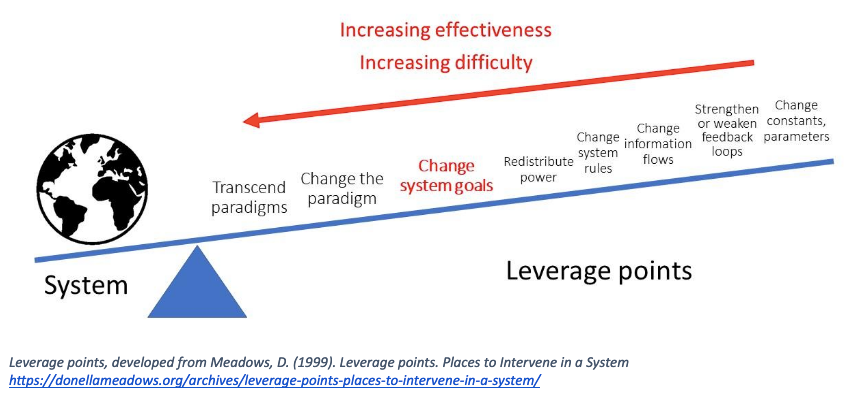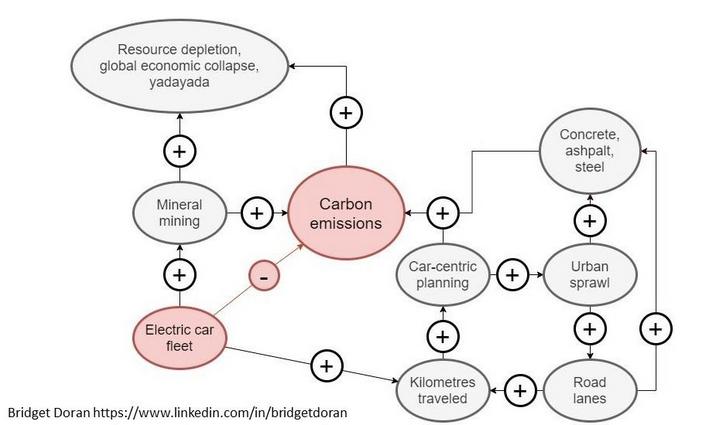What every climate-concerned professional can do today to sleep better tonight


· 4 min read
Climate change and other crises call for radical changes to government policy, but if those changes aren’t forthcoming, what can professionals do in the meantime? How can an awake and informed cog in the system of any profession contribute towards what they might see as useful progress? Can we channel the enthusiasm of professionals who might be losing sleep over the lack of useful climate progress in their sector?
Donella Meadows’ words on where to intervene in complex systems are more important, and more helpful than ever. While we await paradigm change, the most useful action within the grasp of each professional is to adopt a new system goal, and to apply it within their everyday working capacity.

In transport, current goals are often clear and unrelated to climate, or high-level and difficult to implement at project level. In road safety we have very clear goals of reducing deaths and serious injuries on road networks. In environment we talk of reducing emissions, but don’t always make projects accountable for that goal.
A new goal for transport that is clear and climate-centric is to promote access while reducing emissions. ‘Reducing emissions’ suggests a more specific, measurable outcome that every project can contribute towards: we need to reduce overall miles travelled by people in private cars.
It is very important that the power source for those cars is irrelevant, because promoting electric cars massively subverts the overarching goal. Pretending that electric cars are OK ignores the bigger need for a paradigm shift: humanity simply will not survive if we continue a mobility-heavy, inequitable car-centric approach to planning our cities.

It’s also important that we promote equity within the overall goal: for some people, particularly low-income and disabled people, miles travelled can and should increase. They currently travel less than other people, so it is the discretionary travel of middle and high-income, non-disabled that we are aiming to reduce.
Conveniently, when city and broader transport planning focuses on reducing miles travelled, we get good outcomes for other traditional transport policy areas too.
Fewer miles travelled improves transport network efficiency by spreading demand for roadspace across fewer trips.
Fewer miles travelled reduces local air and tyre particulate pollution, resulting in healthier streets for people who live, travel and play – in short, humans who breathe - near traffic lanes.
And importantly, fewer miles travelled improves road safety by reducing exposure to harm. Road safety is a huge industry within transport and its professionals are, to their credit and perhaps to a fault, passionate about reducing risk of death and serious injury on road networks. To a fault, because there is no use making road networks safe if humans are not around to travel on them, or if energy becomes so scarce and expensive that independent, powered mobility becomes even more of a privilege than it already is.
We need to downgrade all objectives in every policy area beneath the goal of preserving the life-supporting capacity of our planet.
The good news is that in transport at least, focusing on promoting access while reducing emissions is climate mitigation, and preparation for a different future. If we can access the activities and resources we need to thrive, within our local communities by walking and riding bicycles, for example, then those communities will be far more resilient to energy shocks, to weather changes, and even to pandemic-induced quarantine – all of which are increasingly likely as the harmony between humans and earth’s broader ecosystem becomes less stable.
We can empower people to be hopeful and proactive by changing system goals at all levels of decision-making. Every transport professional can ask themselves the same question, regardless of their level of experience or position within public or private organisations - how does this action, meeting, project, programme or policy contribute to the life-supporting capacity of the planet? If it is indeed reducing private car miles travelled, is it supporting access to the activities that make a good life?
Until the paradigm shift is forced upon us, changing system goals is a tangible and essential step for all of us.
illuminem Voices is a democratic space presenting the thoughts and opinions of leading Sustainability & Energy writers, their opinions do not necessarily represent those of illuminem.
illuminem briefings

Electric Vehicles · Green Tech
illuminem briefings

Social Responsibility · Sustainable Mobility
illuminem sustainability job listings

Corporate Sustainability · Environmental Sustainability
H2-View

Hydrogen · Sustainable Mobility
BBC

Electric Vehicles · Public Governance
Euronews

Sustainable Mobility · Climate Change